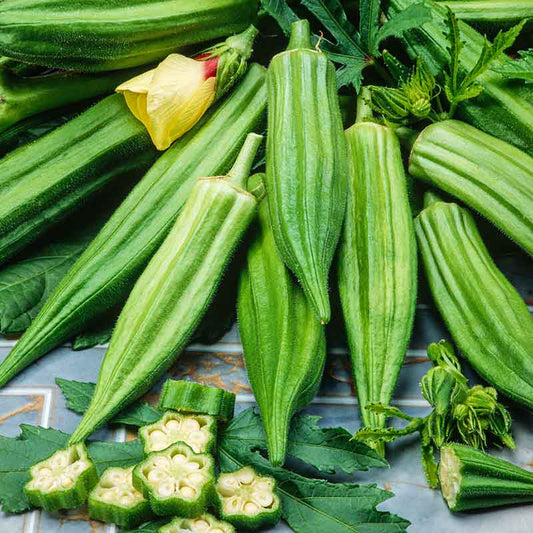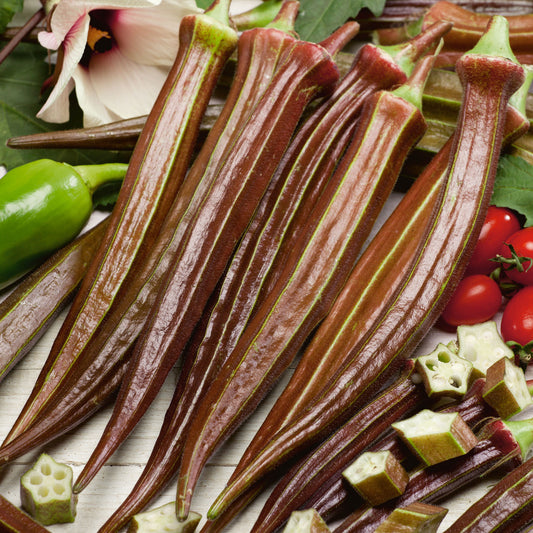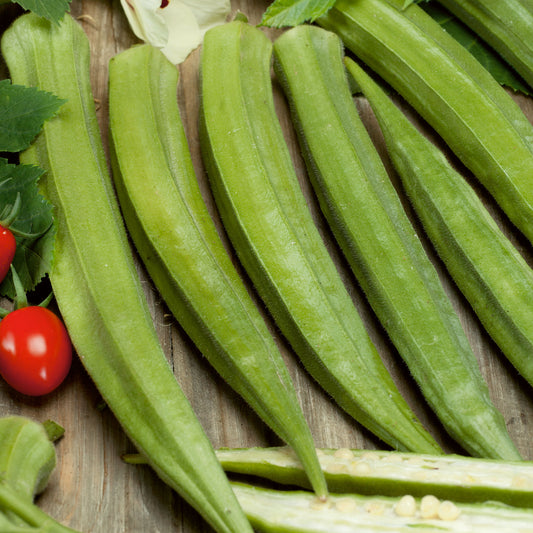-
main-collection-product-grid

Okra Seeds (Organic) - Clemson Spineless
Classic warm weather okra choice from the 1930sOkra Seeds (Organic) - Clemson Spineless
Classic warm weather okra choice from the 1930sRegular price As Low As $6.99Regular priceUnit price per -
main-collection-product-grid

Okra Seeds (Organic) - Red Burgundy
A beautiful crimson color to beautify your garden and dinner tableOkra Seeds (Organic) - Red Burgundy
A beautiful crimson color to beautify your garden and dinner tableRegular price As Low As $6.99Regular priceUnit price per -
main-collection-product-grid

Okra Seeds (Organic) - Cow Horn
Long and twisted like a cow's horn, crunchy and flavorfulOkra Seeds (Organic) - Cow Horn
Long and twisted like a cow's horn, crunchy and flavorfulRegular price As Low As $6.99Regular priceUnit price per
Why organic okra is for everyone (not just southerners)
- Thrives in bright, sunny growing areas
- Highly productive plant with consistent yields
- Seed pods are rich in vitamins and antioxidants
- Yellow-white flowers are gorgeous in bouquets
Grow (and cook!) the best organic okra
Organic okra is a heat-loving annual and vigorous grower in the proper conditions. In the same family as hibiscus and hollyhock, organic okra produces a beautiful flower that eventually turns into a seedpod, the edible part of the plant. Organic okra will likely be the most productive plant in your vegetable garden. Once the first pods come on, you’d better check your plants daily for the remainder of the season. Be prepared to cook a lot of gumbo and make friends with folks who love to eat!
How to grow your own organic okra
Organic okra has a reputation for only growing in hot regions, and many gardeners won’t touch it for this reason. But with a little extra effort and preparation, you can enjoy homegrown organic okra in any hardiness zone. Organic okra is very sensitive to cold weather, so to get a jump start on the season you can start seeds indoors four weeks prior to your area’s last frost. Wait to direct sow seeds until soil temperature reaches at least 65°F. Organic okra prefers full sun and nutrient-rich soil. Be sure to plant organic okra in a row or raised bed where it won’t shade out other crops, as most varieties grow between three and six feet tall. Harvest seed pods when young, and pick them often—it doesn't take long for okra to turn woody and unpalatable.
The nutritional value of organic okra
Organic okra is a low-calorie food that packs a nutritional punch. The seedpods are rich in Vitamins A, C, and K—as well as cancer-blocking antioxidants. Incorporating organic okra into your diet may also help manage cholesterol levels and blood sugar. Organic okra does tend to have a slimy texture until cooked properly. Saute seedpods in a skillet on high heat or roast in the oven to improve the texture. Organic okra is delicious in gumbo, soups, and stews, or even in marinara sauce!
Organic okra is such an easy plant to grow and a powerhouse come harvest time. With all the nutrition that this old-time favorite brings to the table, there’s no reason to not grow organic okra in your garden this season! Eden Brothers offers three varieties of organic okra that will not disappoint.
For more information about planting, growing, and harvesting organic okra seeds, see the Okra Seeds Planting Guide.


